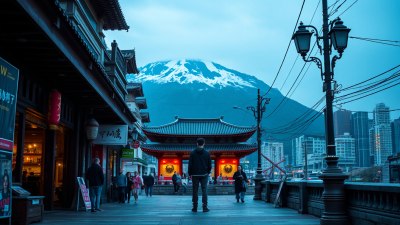Standing Still in a Foreign Place to Hear Yourself
Explore the importance of solitude in foreign settings to discover your true self.

In today's fast-paced world, the idea of standing still in a foreign place may sound counterintuitive. We are conditioned to be constantly on the move, driven by our responsibilities, careers, and social obligations. However, taking a moment to pause and be present in a new environment can lead to profound insights about ourselves. Standing still in a foreign place allows us to slow down, reflect, and hear our inner voice without the distraction of daily life.
The concept of standing still can be understood in various contexts. It can refer to literal physical stillness in a new geographic location, or it can mean a mental state of being present and aware. When we navigate unfamiliar surroundings, the hustle and bustle can overwhelm us. Yet, choosing to stop and observe allows us to absorb our surroundings deeply. The sights, sounds, and smells, all contribute to an experience that can help us listen to our thoughts and emotions.
The Benefits of Solitude
Solitude has garnered a reputation for being a lonely experience; however, its benefits are undeniable. In solitude, we can peel back the layers of societal expectations and dive into our inner selves. In a foreign place, this solitude can be amplified. The very strangeness of our surroundings often opens up new ways of thinking. Without familiar distractions, we can confront our thoughts and feelings more effectively.
Research suggests that solitude can enhance creativity, boost problem-solving skills, and increase self-awareness. When we are away from our typical environment, we can engage in creative thinking unimpeded by our daily routines. It grants us the space to explore new ideas and even remedy old problems from fresh angles.
Listening to Your Inner Voice
Finding a place to stand still gives us the opportunity to engage actively with our thoughts. Listening to our inner voice can sometimes be a daunting task, especially in the noise of life. In a foreign landscape, this task becomes more manageable, as our surroundings can bring clarity to our thoughts. The need to adapt to a new environment often prompts introspection.
As we take a moment to stand still, we allow our thoughts to flow freely. It is essential to create an environment where we can feel a connection with our inner self. Whether it be a quiet park, a serene beach, or a bustling city street, the key is to find a spot where we feel comfortable and at ease. From this stable position, we can better engage in meaningful self-reflection and contemplation.
The Cultural Shift
Embracing solitude in a foreign land often requires a cultural adjustment. Different cultures have varying perceptions of silence and stillness. In some societies, it is valued, and people often seek quiet moments to reflect. In others, silence may be perceived as awkward or uncomfortable. Understanding these cultural frameworks can enhance our experience of standing still.
For instance, in many Eastern cultures, meditation and mindful practices are leans towards embracing stillness and solitude. Conversely, Western cultures may be more preoccupied with continual engagement and interaction. Navigating these cultural nuances can provide further insights into our inner worlds. Integrating aspects from these different cultures can empower us to find our balance in solitude and community.
Nature as a Companion
When standing still in a foreign place, engaging with nature can be immensely beneficial. Nature often has a calming effect and can help ground us. Immersing ourselves in natural surroundings while standing still can foster deeper connections with ourselves. Whether it is the sound of waves lapping on the shore or the rustle of leaves in the wind, nature can facilitate moments of peace.
For example, consider standing on a mountaintop in a foreign country. The expansive view can inspire feelings of awe and reflection. In that serene moment, surrounded by an untouched landscape, we can confront our personal ambitions, fears, and desires. The stillness encourages us to be honest with ourselves, as we have no distractions to deter us from self-examination.
Developing a Mindful Practice
To effectively extract meaningful insights from our time spent standing still, integrating a mindful practice can be invaluable. Mindfulness involves being present and fully engaged in the moment. This practice does not require lengthy sessions of meditation; it can simply involve focusing on your breath, the sensations in your body, or the sights around you in a foreign setting.
Setting aside a few minutes each day to engage in mindfulness can enhance our overall experience of solitude. It trains our minds to filter out distractions and listen to what truly matters. Over time, this practice can sharpen our intuition and help us clarify our desires and goals.
Experiencing Transitions
Standing still in foreign places serves as a transition point in several ways. It provides an opportunity for personal growth by displacing us from daily routines. Change is often uncomfortable, but it can lead to significant self-discovery. Movement through a foreign landscape can symbolize the journey through one’s own life, highlighting moments of discomfort, joy, and everything in between.
The act of stopping to reflect in these transitory moments allows us to assess where we are and where we want to go. On our journeys, we can ask ourselves probing questions: What do I truly seek in life? What are my passions? What experiences shape my identity? The answers to these queries often become clearer when we are removed from the distractions of our daily environments.
The Role of Journaling
Documenting our thoughts while we stand still breeds self-awareness that can be transformative. Writing encourages us to articulate our experiences and feelings, preserving valuable insights for future reflection. Keeping a journal during our travels can serve as a therapeutic outlet, enabling moments of clarity.
When in a foreign place, a journal can become a trusted companion. By penning our thoughts, we create an archive of our inner dialogue that we can revisit later. As we write, we may uncover patterns or themes that emerge through our reflections. This process can make visible our inward journeys, putting context to our experiences.
Sharing Insights with Others
Lastly, sharing our insights with others can deepen our understanding of ourselves. Engaging in conversations about our experiences in foreign places can foster connection and empathy. It provides an opportunity to share our journeys and engage with diverse perspectives.
In group settings, encouraging open discussions around solitude and discovery can be enlightening. Hearing others’ thoughts, whether in person or through online forums, can enhance our appreciation for our unique experiences. It can produce a sense of belonging, illustrating that although we may be standing still in a foreign place, others share the journey of self-discovery.
In conclusion, standing still in a foreign place is not just about physical inactivity, but it is a profound opportunity for introspection and self-discovery. The benefits of solitude, cultural nuances, and the integration of nature all contribute to unique moments of clarity. A mindful practice can amplify these experiences, providing deeper insights into our desires and ambitions. Through journaling and sharing our insights, we connect more intimately with ourselves and others, fostering an enriching experience of standing still that transcends the geographical foreignness of our surroundings.











